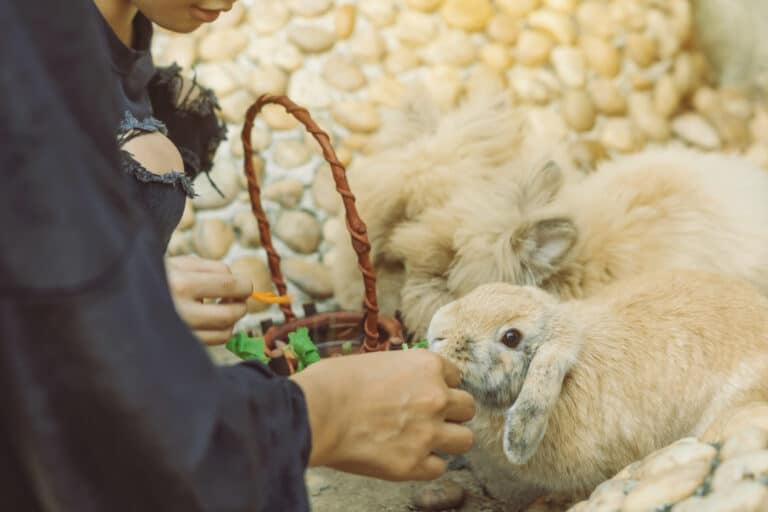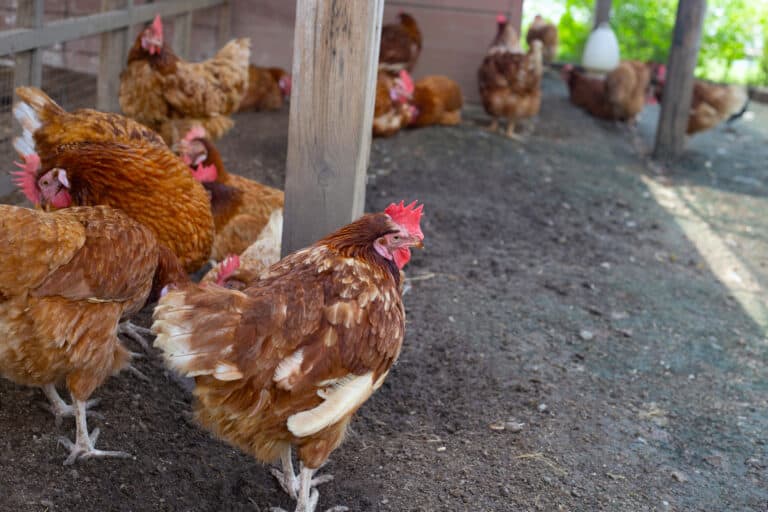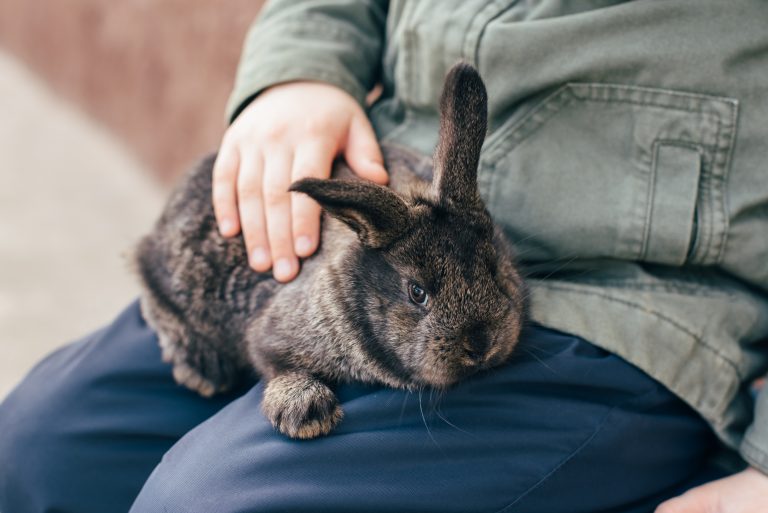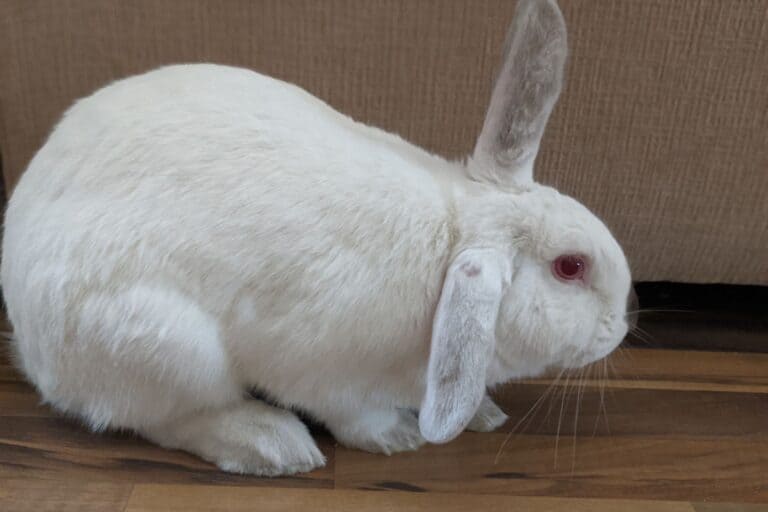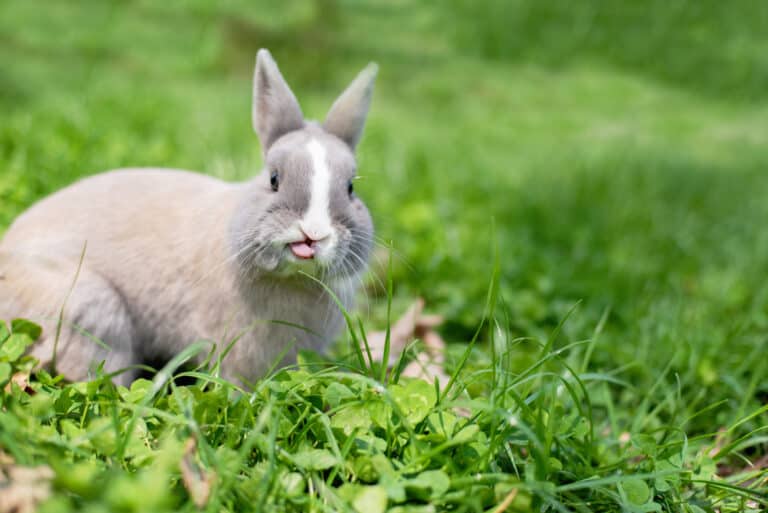Do Rabbits Hibernate in the Winter?
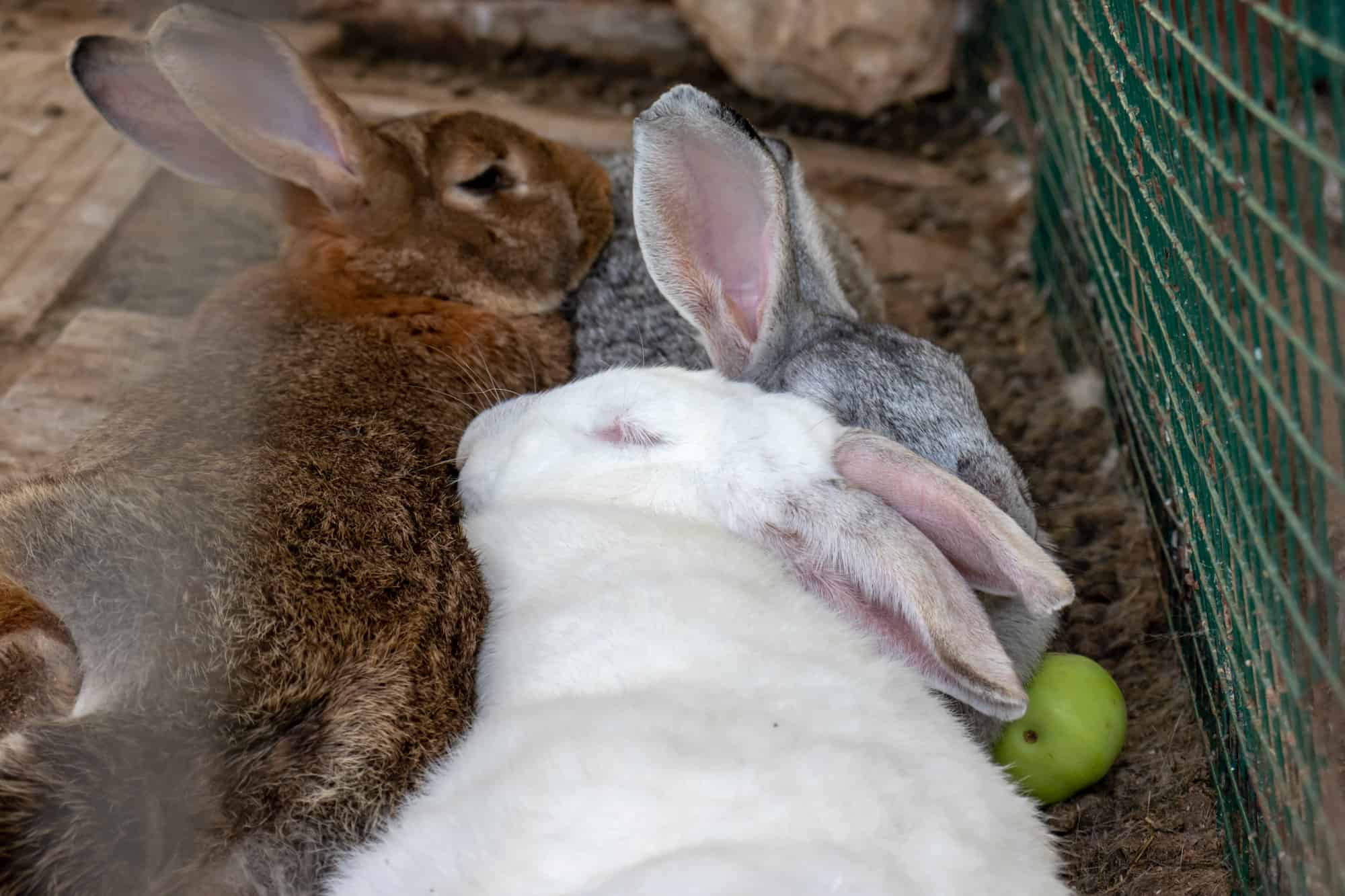
We all know how bears and other animals snooze during the cold months. They do that to conserve energy while food is scarce. But you’ve probably wondered, do rabbits hibernate in the winter too?
If you’re lucky enough to live close to nature, increased sightings of bunnies as spring approaches can reinforce the question. If rabbits don’t hibernate, how come you don’t see them as often during the winter?
Excited to find out? Let’s dig in and discover if rabbits hibernate or do they keep hopping all year round.
What is Hibernation?
Hibernation is like taking a long nap, but instead of getting the hours of sleep typical during warmer weather, animals who hibernate slumber for weeks or even months. During hibernation, their body temperature drops really low, and their breathing and heart rate slow down a lot, too.
Animals that hibernate include bears, chipmunks, and some species of bats. It’s an excellent survival strategy that helps them conserve energy and make it through the cold winter months when their food supply is limited.
Do Rabbits Hibernate in the Winter?
If you’ve had your fur baby for a long while, you must already know that a pet rabbit doesn’t sleep away the chilly months like bears in hibernation. Also, being in your care, he doesn’t have the option to up and go somewhere when cold temperatures herald the start of the winter season.
But given the choice, do you think he’ll go someplace warm? What about wild rabbits? Do they take a long snooze during that time of the year when food sources are scarce?
Well, even in the wild, bunnies don’t hibernate. In fact, a rabbit’s body is not designed for hibernation and can’t sustain prolonged hours of sleep without food or water.

Do Rabbits Migrate?
Some animals migrate to escape cold temperatures, sometimes moving long distances from their home. Birds fly south, and fish, like salmon, go to the ocean. Other mammals practice seasonal migration to regions with ample food supply.
However, bunnies don’t belong to this group of migrating animals. The reason you don’t see them as often during harsh weather is because they go into their burrow, their safe hiding place, where it’s nice and cozy.
How Do Rabbits Survive Cold Winters?
Despite their fragile appearance, rabbits are pretty sturdy and can adapt to their environment. When it comes to temperatures, they can tolerate cold weather better than hot days.
As such, they don’t need to get away from areas with freezing weather. Because they don’t migrate, they make behavioral and physical modifications to help them survive the winter chill.
That said, if you keep your pet rabbit outdoors, moving him inside during harsh weather is best. Young rabbits, in particular, are less able to endure cold temperatures.
In the wild, buns manage to survive the chilly weather because of the following four reasons:
1. Shedding Slows Down or Stops
Rabbits have a natural process called molting, where they shed their old fur and grow a new coat. But when winter arrives, and the temperatures drop, the shedding slows down or even stops altogether.
The fur acts as insulation, trapping a layer of air close to their skin, which helps keep them warm. Because they’re not losing as much hair during the winter, rabbits get a thicker coat that aids in maintaining an ideal body temperature.
2. Diet Changes
Leafy vegetation is hard to find during the winter season. Most young plants, vegetables, and berries are gone, consumed by other animals. To address the lack of food that was readily available during the warmer months, buns switch to a wood-based diet. Barks of trees, twigs, roots, and needles of evergreen trees become rabbits’ winter foods.
Fortunately, buns also eat cecotropes, a type of nutrient-rich rabbit poop that can help tide them over the period of low food availability. These unique bun droppings contain vitamins, minerals, fiber, and other nourishing substances rabbits need.
Thanks to their ability to adapt to a different diet, bunnies are assured of getting enough food when their usual fare is difficult to find.
3. Reduced Activity
Rabbits tend to sleep more and are less active during winter to conserve calories. In this way, the energy from their food is primarily used to generate body heat rather than being utilized for other activities.
Another way reduced activity helps rabbits stay warm in cold weather is by minimizing exposure to the cold. When the weather’s chilly, you may notice that your pet stays in the loaf position rather than sprawling or flopping on his side. That’s because the loaf position reduces the amount of body surface exposed to the cold and helps him retain body heat better.
4. Heading for the Burrow
Wild rabbits live in an underground tunnel network called burrows. During warmer months, they tend to stay out of their burrows for longer periods compared to the winter season. They spend their time grazing for food, which is more abundant at that time of the year. The breeding season also typically occurs in spring and summer, prompting buns to socialize and increase their chances of finding a mate.
However, the onset of cold weather drives rabbits to their underground hide-out, which provides warmth and protection from the frigid temperatures. Burrows are small and compact, with narrow entrances that help to trap heat. This design helps to reduce the amount of cold air that can enter the den, keeping the interior warm.
Also, as they snuggle together inside their cozy and safe hiding place, their collective body heat help regulate the temperature in the burrow. This aids in keeping their body temperature at an ideal level.

How to Help Rabbits During Cold Weather
Food availability is just one of the challenges rabbits face during cold winters. They’ll also have to deal with exposure to the elements and lack of cover from predators. Helping them out can increase their chances of making it through the season.
Wild Rabbits
For wild rabbits, you can usually let nature take its course. Wild bunnies have been hard-wired to survive the harsh weather. Young rabbits, however, may have lower chances of making it, particularly through extremely cold winters. If you can’t bear the thought, here are a couple of things you can do.
1. Grow Hardy Plants, Trees, and Bushes
Choose varieties that can withstand chilly conditions. This will help augment the food supply of wild rabbits and, hopefully, will ensure they thrive all year round. Having enough food can boost the possibility of rabbits surviving the winter months with relative ease.
2. Provide Shelter
We’re not saying you should build outdoor housing for wild buns that cruise your property, although you can if you want to. We’re talking about letting wild rabbits take shelter under your porch.
The sparse foliage often leads to a lack of cover, making it easier for predators to spot them. As such, small nooks and crannies in your yard can become a bun’s safe hiding place.
Domesticated Rabbit
You have little to worry about if you keep your pet rabbit indoors, as the cold temperatures won’t affect him as much. The food supply will not likely be a problem, either, because you’ll be feeding him.
However, you’ll need to take precautions for bunnies who stay outdoors. Although rabbits can withstand low temperatures, it can get too cold for them.
1. Make Sure Your Rabbit Has Enough Food and Water
Rabbits, like all animals, need proper nutrition to thrive, especially during the colder months when their bodies work harder to maintain their temperature. Hay is a staple in your bun’s diet, giving him the nourishment he needs and helping keep his teeth from growing too long.
Make sure you provide a generous amount of fresh, good-quality hay, as your furry pal may need more food to generate heat and keep his body temperature at the ideal range. Also, check that the hay stays dry and mold-free.
Keep your bun’s water in a bowl. The spout of bottles can freeze during cold weather, depriving your pet of water. Replace the contents of the bowl frequently to ensure freshness.
2. Verify That Your Rabbit Is Eating Well in the Summer
Wild rabbits take advantage of the abundant food supply during the summer to gain weight. They’ll then use the stored fat during the winter to keep them warm. The same goes for your pet rabbit. He’ll need extra fat in his body to serve as insulation and to maintain his temperature during the cold season.
Weigh your bun regularly to see if he’s gaining weight. Also check for the presence of cecotropes. Seeing plenty of these unique droppings means your rabbit is eating well and can effectively digest his food.
3. Keep Your Rabbit’s Hutch Snug
Place your pet’s housing in sheltered spots to reduce the impact of the harsh weather, and check it daily for water leakage or dampness. Rabbits hate being wet, and getting chilled can lead to health issues such as snuffles.
Insulate the hutch to keep the chilly air out. You can use polystyrene or bubble wrap to line the hutch’s walls, roof, and floor. Make sure to seal any gaps or cracks to prevent drafts.
4. Provide Ample Bedding
Bedding plays a crucial role in keeping your furry pal warm. Choose thick and cozy bedding material, such as straw or hay, and layer it generously in the hutch. Avoid using wet bedding. Dampness can make your rabbit feel colder and more susceptible to illnesses. Remember to replace your pet’s bedding daily to keep it fresh.
It’s clear that rabbits do not hibernate. These adorable creatures are active throughout the year, regardless of the weather. Unlike other animals that slow down or go into a state of hibernation during winter, rabbits remain fully awake and alert, hopping around and foraging for food.
However, you can help tide them over the time of the year when they must deal with freezing temperatures and limited food sources. Providing them with food, water, and adequate shelter is crucial for their survival and well-being.
More on Rabbit Care
- How Long Do Flemish Rabbits Live: Giant Breed Facts
- Complete Guide to the Best Hay For Rabbits: Reviews & More
- Are Rabbits Rodents? Find Out More About These Small Mammals
- Is Oat Hay Good for Rabbits? Complete Guide to the Best Hay
- Why Do Rabbits Lick You? 11 Reasons for This Common Behavior
We hope you enjoyed this post! If you did, will you give it a share or two 🙂 Thank you! ~from Every Bunny Welcome


